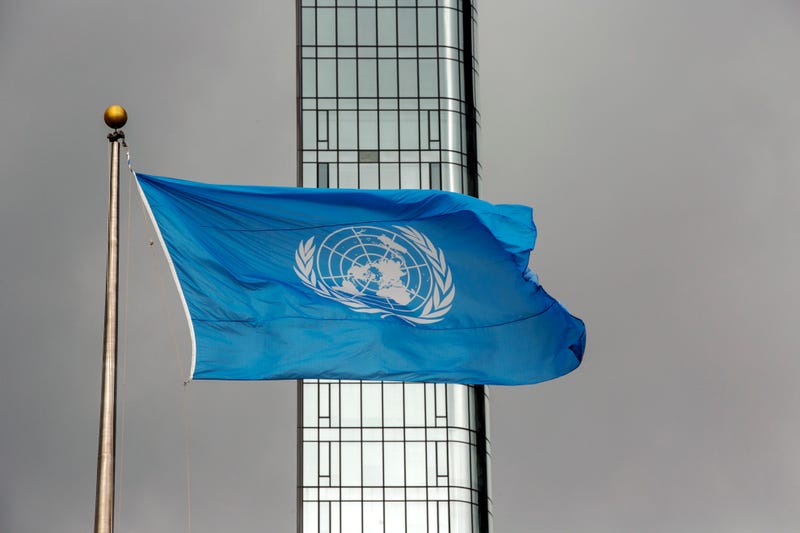
UNITED NATIONS (AP) — The United States once again vetoed a U.N. Security Council resolution Thursday that had demanded an immediate and permanent ceasefire in Gaza and the release of hostages, saying that the effort did not go far enough in condemning Hamas.
The 14 other members of the United Nations’ most powerful body voted in favor of the resolution, which described the humanitarian situation in Gaza as “catastrophic” and called on Israel to lift all restrictions on the delivery of aid to the 2.1 million Palestinians in the territory.
“U.S. opposition to this resolution will come as no surprise,” Morgan Ortagus, a senior U.S. policy adviser, said before the vote. “It fails to condemn Hamas or recognize Israel’s right to defend itself, and it wrongly legitimizes the false narratives benefiting Hamas, which have sadly found currency in this council.”
She added that other council members “ignored” U.S. warnings about the “unacceptable” language and instead adopted “performative action designed to draw a veto.”
The outcome further highlights U.S. and Israeli isolation on the world stage over the nearly two-year war in Gaza. The vote came just days before the annual gathering of world leaders at the U.N. General Assembly, where Gaza will be a major topic and major U.S. allies are expected to recognize an independent Palestinian state. It is a largely symbolic move vehemently opposed by Israel and the U.S., dividing the Trump administration from allies including the U.K. and France.
The latest resolution tied a ceasefire to the release of hostages
The resolution, drafted by the council’s 10 elected members who serve two-year terms, goes further than previous drafts to highlight what it calls the “ deepening of suffering ” of Palestinian civilians.
“I can understand the anger and frustration and disappointment of the Palestinian people who might be watching this session of the Security Council, hoping that there is some help in the pipeline, and this nightmare could be brought to an end,” said Riyad Mansour, the Palestinian ambassador to the U.N. “I can imagine the anger and frustration that it did not happen.”
Algeria, one of the leaders of the resolution, also expressed dismay at another failed council action for Gaza, apologizing to Palestinians for not doing enough to save civilians’ lives.
Despite the effort failing to pass, Algeria’s U.N. ambassador, Amar Bendjama, said: “14 courageous members of this Security Council raised their voice. They have acted with conscience and in the cause of the international public opinion.”
Pakistan's ambassador called the vote, which took place during the 10,000th meeting of the Security Council, “a dark moment.”
Danny Danon, Israel’s ambassador to the U.N., blasted the new effort, saying it would “not release the hostages and will not bring security to the region.”
“Israel will continue to fight Hamas and protect its citizens, even if the Security Council prefers to turn a blind eye to terrorism,” he said in a statement.
What the UN resolution called for
The effort reiterated demands from previous versions, including the release of all hostages held by Hamas and other militant groups following their Oct. 7, 2023, surprise attack in southern Israel that launched the war in Gaza.
In opposing similar resolutions since November, the U.S. had complained that the demands, including a ceasefire, were not directly linked to the unconditional release of hostages and would only embolden Hamas militants.
The new resolution expressed “deep alarm” after a report released last month by the world’s leading authority on food crises said Gaza City has become gripped by famine, and that it’s likely to spread across the territory without a ceasefire and an end to restrictions on humanitarian aid.
Israeli forces have pressed on with a new ground offensive in Gaza City. The latest Israeli operation, which started Tuesday, further escalates a conflict that has roiled the Middle East and likely pushes any ceasefire further out of reach.
The Israeli military, which says it wants to “destroy Hamas’ military infrastructure,” hasn’t given a timeline for the offensive, but there were indications it could take months.
Other recent UN actions on Gaza
That same day, a team of independent experts commissioned by the U.N. Human Rights Council concluded that Israel is committing genocide in Gaza, issuing a report that called on the international community to end it and take steps to punish those responsible for it.
Last week, the U.N. General Assembly voted overwhelmingly to support a two-state solution to the Israel-Palestinian conflict and urged Israel to commit to a Palestinian state.
The U.S. veto of the resolution comes as about half of Americans say the Israeli military response in the Gaza Strip has “gone too far,” according to the survey from The Associated Press-NORC Center for Public Affairs Research. That’s up from November 2023, when 40% said Israel’s military action had gone too far.
But at the same time, Americans overall, particularly Republicans, are less likely to say that negotiating a ceasefire should be a high priority for the U.S. government than they were just a few months ago when the U.S. was holding ceasefire talks with Hamas.